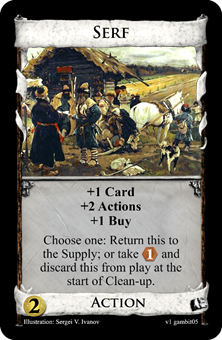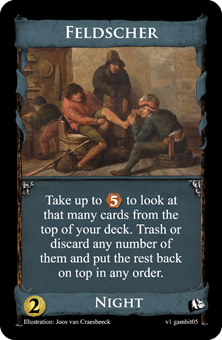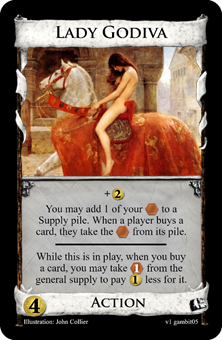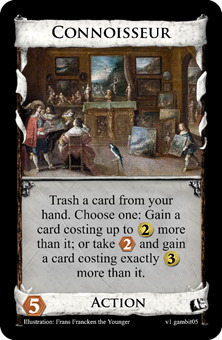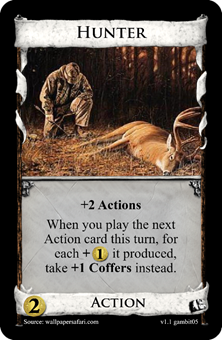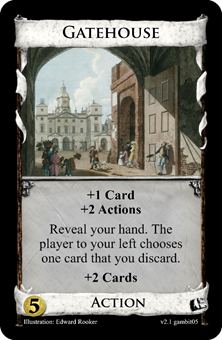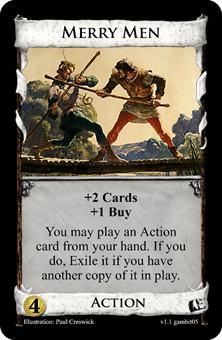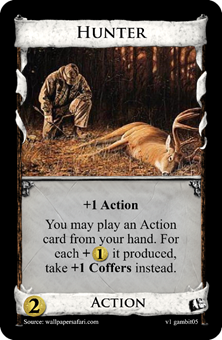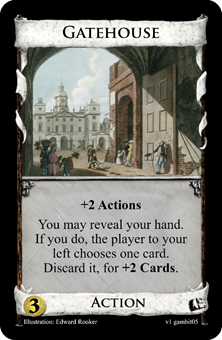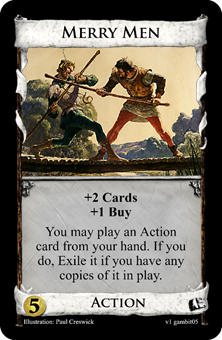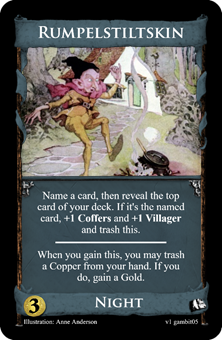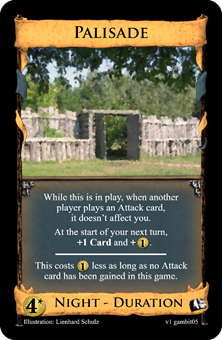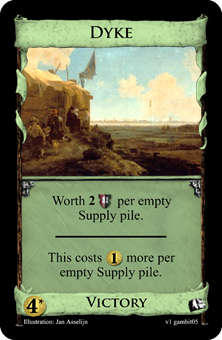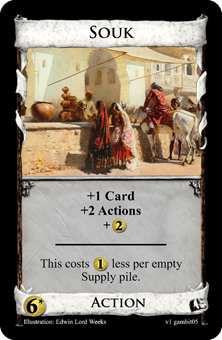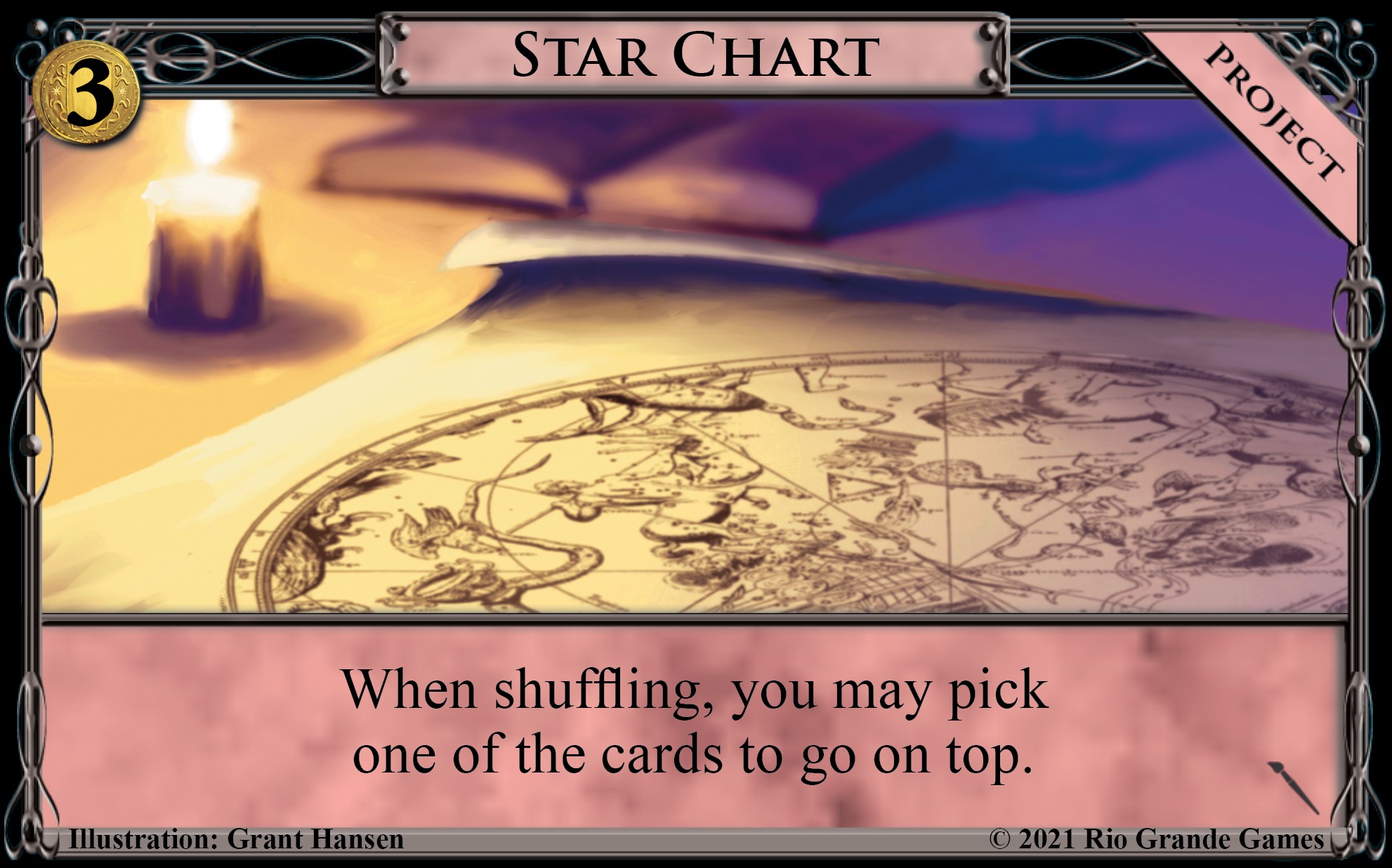1
Variants and Fan Cards / Equipment - Update
« on: March 26, 2021, 02:29:45 pm »
Equipment cards
When I introduced the concept of Equipment cards a while back, we had a lot of discussions, though it was mostly about the terminology. On one hand, this allowed me improving the cards and fine tuning the mechanic and it’s terminology; on the other hand, it left the original thread in quite a mess. Moreover, in the meantime I have designed more Equipment cards, improved some of the original ones, and retracted some others. Now, I think it’s time for an update of the Equipment cards. I would like to describe the mechanics and to present those Equipment cards that I currently consider to be the more interesting ones without being too complex and too wordy. I tried to find a good mix of relative simple cards and of cards that provide different aspects of the concept.
Overview
Equipment cards are non-Supply cards that are not part of a pile, likewise Shelters and Heirlooms, and usually come in a single copy per player. If a certain Kingdom card is included in a game, each player gets the associated Equipment card(s). At the start of the game, players put the Equipment cards next to them and add them to their deck under certain circumstances via a process called Equip.
Color code
Kingdom cards that have associated Equipment cards have a light blue banner that names its Equipment card(s) (adapted from the yellow banner of Heirlooms from Nocturne). Equipment cards are labeled with the Equipment type and colored in light blue (instead of the white-greyish color for the Action type). This is combined with other colors (e.g. black for Night, yellow for Treasure) where required. Some Equipment cards can be put on the player’s Cabinet mats to modify or activate abilities. Each player has their own Cabinet mat. Those Cabinet-Equipment cards are specified by the Cabinet type and have, in addition to the light blue Equipment type color, a tan-colored text field (akin to the Reserve cards of Adventures). Cards on the Cabinet mat still count as part of the player’s decks, whenever this is relevant (e.g. for Gardens at the end of the game).
Equip
Equipment cards enter the game via the instruction Equip. This can occur through the respective Kingdom card or when a specific event happens. Equipping of some of the Equipment cards is mandatory, whereas it is optional for others. Before being Equipped, Equipment cards are in a “stand by” mode, and as such do not count as part of the players’ decks. If not otherwise specified, Equipping an Equipment card means that the card is put to the player’s discard pile. This is neither gaining nor discarding them and thus doesn’t trigger any events such as “when you gain a card…” or “when you discard…”. Once Equipped, Equipment cards are part of the players’ decks, unless they are trashed or removed in some other ways.
Cards




Bowman/Quiver
Quiver is a cantrip, which can be trashed for some bonus. Bowman is a Peddler variant that can gain cards from the trash, including Quiver, whether it’s their own or from another player.
A player can Equip their Quiver any time when they have exactly 3 Action cards in play. This is obligatory and independently of Bowman, i.e. a player can play with Bowman and ignores Quiver and vice versa. Like for most other Equipment cards, each player has a single copy of Quiver available.
Observatory/Telescope
Observatory is a draw-to-X variant that allows setting cards aside before drawing. Those cards go back to hand in the Night phase of the same turn and thereby bypass the rest of the Action phase and the Buy phase. Telescope is a Night card that interacts with Observatory in two ways. It can be set aside by Observatory and still be played in the same turn and it can support Observatory as it allows playing an Action card in the Night. Similar to Quiver, Equipping Telescope is optional. Here, the requirement is simply deck shuffling.
Lady Godiva/Clothes
Lady Godiva is a Kingdom card that uses as a mechanic. I have designed quite a number of cards that extent the ideas of
as a mechanic. I have designed quite a number of cards that extent the ideas of  beyond its usage in Empires. If you want to know more about it, here is the original thread, though it is somewhat outdated. Clothes is an Action – Night card that can be played in either of the two phases, thereby providing flexibility of its “taxing” function. Playing it in the Action phase allows getting rid of
beyond its usage in Empires. If you want to know more about it, here is the original thread, though it is somewhat outdated. Clothes is an Action – Night card that can be played in either of the two phases, thereby providing flexibility of its “taxing” function. Playing it in the Action phase allows getting rid of  before the Buy phase starts; whereas playing it in the Night phase allows getting rid of
before the Buy phase starts; whereas playing it in the Night phase allows getting rid of  taken in the Buy (or Night) phase.
taken in the Buy (or Night) phase.
Adding the Equipment Clothes to a player’s deck is optional and can happen when their deck is shuffled, like with Telescope. However, here it comes with a cost in that the player who wants to Equip Clothes has to take .
.




Trident/Cyclops, Harpy, Siren
When played, Trident offers 3 options. It can Equip one of its not yet Equipped Equipment cards, in this case directly to a player’s hand. The 3 Equipment cards are all Attack cards that can harm other players in different ways and are trashed after being played. Here comes Trident’s 2nd option into the game. Instead of Equipping one of its Equipment cards, Trident can also recover them from the trash. If anything else of value is in the trash, Trident can gain that other card instead. Thus, although the Equipment cards are one-shot Attacks, they can be easily recycled through Tridents, though not necessarily from the same player. Finally, the 3rd option of Trident is simply giving + . Maybe, a player doesn’t have anything to Equip anymore, and there is nothing of value in the trash, or maybe, getting to a certain
. Maybe, a player doesn’t have anything to Equip anymore, and there is nothing of value in the trash, or maybe, getting to a certain  amount has a higher priority than attacking the other players.
amount has a higher priority than attacking the other players.




Drummer/Drums
Drummer and Drums are Treasures producing and a potential bonus of +1
and a potential bonus of +1  . Adding the Equipment Drums to the players decks is almost mandatory, i.e. it can be only avoided if a player manages to never gain any Treasures. In principle, players can play with Drums and ignore the respective Kingdom card, Drummer, though there is a nice benefit when Drummer is played at the right time. These cards include the mechanic Morale, which has been described elsewhere. Briefly, Morale cards form a mixed pile of Boons/Hex-like landscape cards that can either give benefits to players, potentially harm them or are neutral in their effects. The actual Morale is received by all players at the start of their turns until the next Morale is revealed. Revealing the next Morale is done by specific cards like Drums. In addition, some cards can produce an extra bonus, depending on the type of the actual Morale, e.g. Drummer and Drums let the player get +1
. Adding the Equipment Drums to the players decks is almost mandatory, i.e. it can be only avoided if a player manages to never gain any Treasures. In principle, players can play with Drums and ignore the respective Kingdom card, Drummer, though there is a nice benefit when Drummer is played at the right time. These cards include the mechanic Morale, which has been described elsewhere. Briefly, Morale cards form a mixed pile of Boons/Hex-like landscape cards that can either give benefits to players, potentially harm them or are neutral in their effects. The actual Morale is received by all players at the start of their turns until the next Morale is revealed. Revealing the next Morale is done by specific cards like Drums. In addition, some cards can produce an extra bonus, depending on the type of the actual Morale, e.g. Drummer and Drums let the player get +1  , if the Morale is high enough.
, if the Morale is high enough.
Mahout/Elephant
Mahout is a Salvager variant with the choice to use the trash-for-draw ability immediately or at the start of the next turn. The Equipment Elephant is automatically Equipped after the first shuffle. It lets players gain some useful cards, which can be used as fodder for their Mahouts if desired. One of those cards is Cart, a one-shot non-Supply card like Horse. Likewise Drums, Elephant changes the players’ Morale, which becomes effective at the start of their turns.




Kingsman/Harp, Shield, Sword, Trumpet
Kingsman comes with four different Equipment cards, all of which as single copies per player. The Equipment cards are Equipped one at a time in any order when a Kingsman is played. When the Equipment cards are played, they are put on the player’s Cabinet mat. On the mat they gradually improve the abilities of Kingsman when played. In this way, Kingsman starts as a Ruined Village that can be upgraded over time to something more powerful than a Grand Market.




Camp/Tent
Each player has a single copy of the Equipment card Tent, which a player Equips when they play a Camp for the first time. Tent can be used in two different way. It can be put on the Cabinet mat to turn subsequently played Camps into Labs, or it can be left in play to produce + for each Camp that is already in play. If on the Cabinet mat, Tent can wait there until the next Camp is played, i.e. this doesn’t have to occur in the same turn. However, once a Camp is played, Tent is discarded from the mat at the Clean-up phase of the same turn.
for each Camp that is already in play. If on the Cabinet mat, Tent can wait there until the next Camp is played, i.e. this doesn’t have to occur in the same turn. However, once a Camp is played, Tent is discarded from the mat at the Clean-up phase of the same turn.
Highwayman/Coach
When Highwayman is in the Kingdom, each player gets 3 copies of Coach (not a single copy). Highwayman hunts other players’ Coaches and lets them trash one, if found. Highwayman can also gain Coaches or any other card from the trash, or alternatively Equips a player’s own Coaches. Coaches can be put on the player’s Cabinet mat where they escape any further hunting attempts and grant the player +2 . Alternatively, Coaches can be used as powerful Action cards, though they remain vulnerable to being caught by the opponents’ Highwaymen. One of the bonuses that such Coaches give is a one-shot Cart.
. Alternatively, Coaches can be used as powerful Action cards, though they remain vulnerable to being caught by the opponents’ Highwaymen. One of the bonuses that such Coaches give is a one-shot Cart.
Update 21. April 2021: Trident seemed a bit too weak. I buffed it indirectly by giving its Equipment cards a small bonus on top of their attack abilities.
When I introduced the concept of Equipment cards a while back, we had a lot of discussions, though it was mostly about the terminology. On one hand, this allowed me improving the cards and fine tuning the mechanic and it’s terminology; on the other hand, it left the original thread in quite a mess. Moreover, in the meantime I have designed more Equipment cards, improved some of the original ones, and retracted some others. Now, I think it’s time for an update of the Equipment cards. I would like to describe the mechanics and to present those Equipment cards that I currently consider to be the more interesting ones without being too complex and too wordy. I tried to find a good mix of relative simple cards and of cards that provide different aspects of the concept.
Overview
Equipment cards are non-Supply cards that are not part of a pile, likewise Shelters and Heirlooms, and usually come in a single copy per player. If a certain Kingdom card is included in a game, each player gets the associated Equipment card(s). At the start of the game, players put the Equipment cards next to them and add them to their deck under certain circumstances via a process called Equip.
Color code
Kingdom cards that have associated Equipment cards have a light blue banner that names its Equipment card(s) (adapted from the yellow banner of Heirlooms from Nocturne). Equipment cards are labeled with the Equipment type and colored in light blue (instead of the white-greyish color for the Action type). This is combined with other colors (e.g. black for Night, yellow for Treasure) where required. Some Equipment cards can be put on the player’s Cabinet mats to modify or activate abilities. Each player has their own Cabinet mat. Those Cabinet-Equipment cards are specified by the Cabinet type and have, in addition to the light blue Equipment type color, a tan-colored text field (akin to the Reserve cards of Adventures). Cards on the Cabinet mat still count as part of the player’s decks, whenever this is relevant (e.g. for Gardens at the end of the game).
Equip
Equipment cards enter the game via the instruction Equip. This can occur through the respective Kingdom card or when a specific event happens. Equipping of some of the Equipment cards is mandatory, whereas it is optional for others. Before being Equipped, Equipment cards are in a “stand by” mode, and as such do not count as part of the players’ decks. If not otherwise specified, Equipping an Equipment card means that the card is put to the player’s discard pile. This is neither gaining nor discarding them and thus doesn’t trigger any events such as “when you gain a card…” or “when you discard…”. Once Equipped, Equipment cards are part of the players’ decks, unless they are trashed or removed in some other ways.
Cards




Bowman  – Action – ActionEquipment: Quiver Quote
| Quiver  – Action - Equipment – Action - EquipmentQuote +1 Card | Observatory  – Action – ActionEquipment: Telescope Quote
| Telescope  – Night - Equipment – Night - EquipmentQuote
|
Bowman/Quiver
Quiver is a cantrip, which can be trashed for some bonus. Bowman is a Peddler variant that can gain cards from the trash, including Quiver, whether it’s their own or from another player.
A player can Equip their Quiver any time when they have exactly 3 Action cards in play. This is obligatory and independently of Bowman, i.e. a player can play with Bowman and ignores Quiver and vice versa. Like for most other Equipment cards, each player has a single copy of Quiver available.
Observatory/Telescope
Observatory is a draw-to-X variant that allows setting cards aside before drawing. Those cards go back to hand in the Night phase of the same turn and thereby bypass the rest of the Action phase and the Buy phase. Telescope is a Night card that interacts with Observatory in two ways. It can be set aside by Observatory and still be played in the same turn and it can support Observatory as it allows playing an Action card in the Night. Similar to Quiver, Equipping Telescope is optional. Here, the requirement is simply deck shuffling.
Lady Godiva  – Action – ActionEquipment: Clothes Quote
|  |  | Clothes  – Action – Night - Equipment – Action – Night - EquipmentQuote
|
Lady Godiva/Clothes
Lady Godiva is a Kingdom card that uses
 as a mechanic. I have designed quite a number of cards that extent the ideas of
as a mechanic. I have designed quite a number of cards that extent the ideas of  beyond its usage in Empires. If you want to know more about it, here is the original thread, though it is somewhat outdated. Clothes is an Action – Night card that can be played in either of the two phases, thereby providing flexibility of its “taxing” function. Playing it in the Action phase allows getting rid of
beyond its usage in Empires. If you want to know more about it, here is the original thread, though it is somewhat outdated. Clothes is an Action – Night card that can be played in either of the two phases, thereby providing flexibility of its “taxing” function. Playing it in the Action phase allows getting rid of  before the Buy phase starts; whereas playing it in the Night phase allows getting rid of
before the Buy phase starts; whereas playing it in the Night phase allows getting rid of  taken in the Buy (or Night) phase.
taken in the Buy (or Night) phase. Adding the Equipment Clothes to a player’s deck is optional and can happen when their deck is shuffled, like with Telescope. However, here it comes with a cost in that the player who wants to Equip Clothes has to take
 .
. 



Trident  – Action – Action Equipment: Cyclops, Harpy, Siren Quote
| Cyclops  – Action – Attack –Equipment – Action – Attack –EquipmentQuote
| Harpy  – Action – Attack –Equipment – Action – Attack –EquipmentQuote
| Siren  – Action – Attack – Looter – Equipment – Action – Attack – Looter – EquipmentQuote
|
Trident/Cyclops, Harpy, Siren
When played, Trident offers 3 options. It can Equip one of its not yet Equipped Equipment cards, in this case directly to a player’s hand. The 3 Equipment cards are all Attack cards that can harm other players in different ways and are trashed after being played. Here comes Trident’s 2nd option into the game. Instead of Equipping one of its Equipment cards, Trident can also recover them from the trash. If anything else of value is in the trash, Trident can gain that other card instead. Thus, although the Equipment cards are one-shot Attacks, they can be easily recycled through Tridents, though not necessarily from the same player. Finally, the 3rd option of Trident is simply giving +
 . Maybe, a player doesn’t have anything to Equip anymore, and there is nothing of value in the trash, or maybe, getting to a certain
. Maybe, a player doesn’t have anything to Equip anymore, and there is nothing of value in the trash, or maybe, getting to a certain  amount has a higher priority than attacking the other players.
amount has a higher priority than attacking the other players.



Drummer  – Treasure – Treasure Equipment: Drums Quote
| Drums  – Treasure – Morale – Equipment – Treasure – Morale – EquipmentQuote
| Mahout  – Action – Duration – Action – DurationEquipment: Elephant Quote
| Elephant  – Action – Morale – Equipment – Action – Morale – EquipmentQuote
|
Drummer/Drums
Drummer and Drums are Treasures producing
 and a potential bonus of +1
and a potential bonus of +1  . Adding the Equipment Drums to the players decks is almost mandatory, i.e. it can be only avoided if a player manages to never gain any Treasures. In principle, players can play with Drums and ignore the respective Kingdom card, Drummer, though there is a nice benefit when Drummer is played at the right time. These cards include the mechanic Morale, which has been described elsewhere. Briefly, Morale cards form a mixed pile of Boons/Hex-like landscape cards that can either give benefits to players, potentially harm them or are neutral in their effects. The actual Morale is received by all players at the start of their turns until the next Morale is revealed. Revealing the next Morale is done by specific cards like Drums. In addition, some cards can produce an extra bonus, depending on the type of the actual Morale, e.g. Drummer and Drums let the player get +1
. Adding the Equipment Drums to the players decks is almost mandatory, i.e. it can be only avoided if a player manages to never gain any Treasures. In principle, players can play with Drums and ignore the respective Kingdom card, Drummer, though there is a nice benefit when Drummer is played at the right time. These cards include the mechanic Morale, which has been described elsewhere. Briefly, Morale cards form a mixed pile of Boons/Hex-like landscape cards that can either give benefits to players, potentially harm them or are neutral in their effects. The actual Morale is received by all players at the start of their turns until the next Morale is revealed. Revealing the next Morale is done by specific cards like Drums. In addition, some cards can produce an extra bonus, depending on the type of the actual Morale, e.g. Drummer and Drums let the player get +1  , if the Morale is high enough.
, if the Morale is high enough.Mahout/Elephant
Mahout is a Salvager variant with the choice to use the trash-for-draw ability immediately or at the start of the next turn. The Equipment Elephant is automatically Equipped after the first shuffle. It lets players gain some useful cards, which can be used as fodder for their Mahouts if desired. One of those cards is Cart, a one-shot non-Supply card like Horse. Likewise Drums, Elephant changes the players’ Morale, which becomes effective at the start of their turns.
 | Kingsman  – Action – Action Equipment: Harp, Shield, Sword, Trumpet Quote
|




Harp  – Action – Cabinet - Equipment – Action – Cabinet - EquipmentQuote
| Shield  – Action – Cabinet - Equipment – Action – Cabinet - EquipmentQuote
| Sword  – Action – Cabinet - Equipment – Action – Cabinet - EquipmentQuote
| Trumpet  – Action – Cabinet - Equipment – Action – Cabinet - EquipmentQuote
|
Kingsman/Harp, Shield, Sword, Trumpet
Kingsman comes with four different Equipment cards, all of which as single copies per player. The Equipment cards are Equipped one at a time in any order when a Kingsman is played. When the Equipment cards are played, they are put on the player’s Cabinet mat. On the mat they gradually improve the abilities of Kingsman when played. In this way, Kingsman starts as a Ruined Village that can be upgraded over time to something more powerful than a Grand Market.




Camp  - Action - Action Equipment: Tent Quote
| Tent  – Action – Cabinet – Equipment – Action – Cabinet – EquipmentQuote
| Highwayman  – Action - Attack – Action - AttackEquipment: 3 Coaches Quote
| Coach  – Action – Cabinet – Equipment – Action – Cabinet – EquipmentQuote
|
Camp/Tent
Each player has a single copy of the Equipment card Tent, which a player Equips when they play a Camp for the first time. Tent can be used in two different way. It can be put on the Cabinet mat to turn subsequently played Camps into Labs, or it can be left in play to produce +
 for each Camp that is already in play. If on the Cabinet mat, Tent can wait there until the next Camp is played, i.e. this doesn’t have to occur in the same turn. However, once a Camp is played, Tent is discarded from the mat at the Clean-up phase of the same turn.
for each Camp that is already in play. If on the Cabinet mat, Tent can wait there until the next Camp is played, i.e. this doesn’t have to occur in the same turn. However, once a Camp is played, Tent is discarded from the mat at the Clean-up phase of the same turn.Highwayman/Coach
When Highwayman is in the Kingdom, each player gets 3 copies of Coach (not a single copy). Highwayman hunts other players’ Coaches and lets them trash one, if found. Highwayman can also gain Coaches or any other card from the trash, or alternatively Equips a player’s own Coaches. Coaches can be put on the player’s Cabinet mat where they escape any further hunting attempts and grant the player +2
 . Alternatively, Coaches can be used as powerful Action cards, though they remain vulnerable to being caught by the opponents’ Highwaymen. One of the bonuses that such Coaches give is a one-shot Cart.
. Alternatively, Coaches can be used as powerful Action cards, though they remain vulnerable to being caught by the opponents’ Highwaymen. One of the bonuses that such Coaches give is a one-shot Cart. Update 21. April 2021: Trident seemed a bit too weak. I buffed it indirectly by giving its Equipment cards a small bonus on top of their attack abilities.












